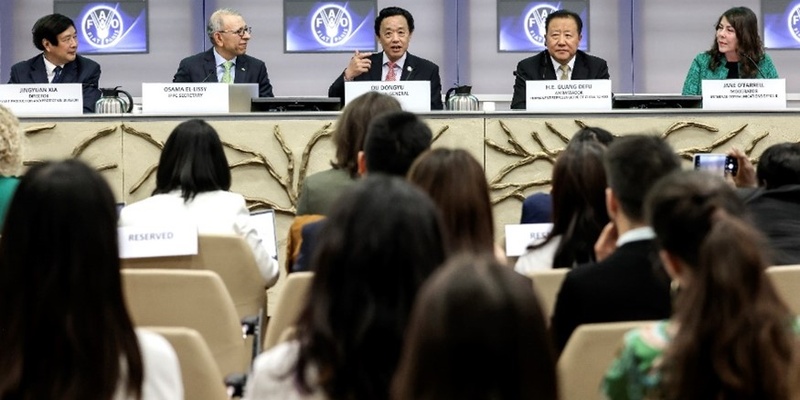Second International Day of Plant Health celebrated: One Health, innovative approaches and partnerships essential for plant health
Posted on Mon, 15 May 2023, 14:46

© FAO/Alessia Pierdomenico
Rome, 12 May 2023. The second global commemoration of the International Day of Plant Health was held successfully, with calls for protecting plants, biodiversity and ecosystems amidst the threat of plant pests.
The International Day of Plant Health, organized by the International Plant Protection Convention (IPPC) Secretariat and the FAO Plant Production and Protection Division, focused on the theme Plant health for environmental protection. A change in climate has seen the presence of plant pests in new areas where they were previously undetected. Plant pests remain one of the biggest causes of biodiversity loss. The world is losing healthy ecosystems that are necessary for plants to thrive, mainly due to environmental degradation.
This year’s commemoration of the International Day of Plant Health comes at a time when more than 800 million people in the world face hunger. And yet annually, the world loses as much as 40 percent of global crop yields or around USD 220 billion because of plant pests and diseases.
This makes achieving food security difficult and causes widespread biodiversity loss in many parts of the world. Furthermore, we lose about 80 percent of insects that are beneficial to plant health every year.
During the high-level hybrid event to mark the Day, FAO Director-General Qu Dongyu stressed in his opening remarks, the importance of plants, on which we depend for 80 percent of our food and 98 percent of the oxygen we breathe.
“We must go beyond talking about protecting plants by taking action,” he said. To ensure plant health, we must “share knowledge and best practices and use advanced technology and resources to develop innovative solutions for plant diseases, invasive alien species and climate change impacts,” he added.
The FAO Director-General highlighted FAO’s approach on One Health, which works within the nexus between animal health, human health and the environment, specifically plant health. He called for more education and awareness-raising interventions, to increase public understanding on the importance of plant health.
The high-level event attracted about 400 virtual participants and 100 attending in person at the Sheik Zayed Centre at the FAO headquarters. Speaking at the policy level were Honorable Mohammad M. Abubakar, Minister for Agriculture and Rural Development of the Federal Republic of Nigeria; His Excellency Guang Defu, Ambassador and Permanent Representative of the People’s Republic of China to FAO; and Ms. Claire Bury, Deputy Director-General, Health and Food Safety at the European Commission.
Experts presented technical topics related to climate change and plant health, invasive alien species as global threats to biodiversity conservation, innovation using data, and strengthening partnerships. Experts presented on behalf of the United Nations Framework Convention on Climate Change (UNFCCC) Secretariat, United Nations Convention on Biological Diversity (UNCBD) Secretariat, the Centre for Agriculture and Bioscience International (CABI) and Gregory Wolff, Chairperson of the Commission on Phytosanitary Measures (CPM), which is the IPPC’s governing body.
Calls to action for plant health
Jingyuan Xia, Director of FAO Plant Production and Protection Division, stated, “Everyone has a role to play in protecting the world’s plants. We need to adopt innovative approaches, especially using data to analyze the global pest situation and carrying out initiatives to prevent pests and protect ecosystems and biodiversity.”
Governments and policy makers were urged to prioritize plant health and protection, support the development and implementation of policies and legislation for plant health and to foster compliance with international plant health standards.
The academia was encouraged to continue carrying out research to improve plant health and contribute to knowledge sharing in the plant health community. The appeal to donors was to invest in new and existing plant health initiatives and technologies; while farmers should use only certified pest-free seeds and seedlings; and regularly monitor and report the occurrence of unusual pests on farms. To the media, the call was to communicate plant health information and key messages, including in local languages. Finally, the public was encouraged to become aware of the risks involved in bringing plants and plant products that may harbor pests and diseases across borders.
IPPC Secretary Osama El-Lissy reflected on the day’s celebration, “I am very pleased to celebrate the International Day of Plant Health with the global plant health community. This important day is an opportunity for us to get all stakeholders on board and help us raise global awareness on why we need to promote plant health. Our lives depend on plants.”
“We are grateful to the IPPC community, contracting parties, donors and partners for their continued support and trust in us,” he said.
Related information:
Think before you click | FAO Stories | Food and Agriculture Organization of the United Nations

